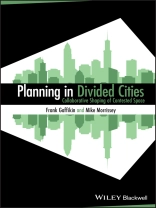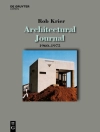Does planning in contested cities inadvertedly make the divisions
worse? The 60s and 70s saw a strong role of planning, social
engineering, etc but there has since been a move towards a more
decentralised ‘community planning’ approach.
The book examines urban planning and policy in the context of
deeply contested space, where place identity and cultural
affinities are reshaping cities. Throughout the world, contentions
around identity and territory abound, and in Britain, this problem
has found recent expression in debates about multiculturalism and
social cohesion. These issues are most visible in the urban arena,
where socially polarised communities co-habit cities also marked by
divided ethnic loyalties. The relationship between the two is
complicated by the typical pattern that social disadvantage is
disproportionately concentrated among ethnic groups, who also
experience a social and cultural estrangement, based on religious
or racial identity.
Navigating between social exclusion and community cohesion is
essential for the urban challenges of efficient resource use,
environmental enhancement, and the development of a flourishing
economy.
The book addresses planning in divided cities in a UK and
international context, examining cities such as Chicago,
hyper-segregated around race, and Jerusalem, acting as a crucible
for a wider conflict.
The first section deals with concepts and theories, examining
the research literature and situating the issue within the urban
challenges of competitiveness and inclusion. Section 2 covers
collaborative planning and identifies models of planning, policy
and urban governance that can operate in contested space. Section 3
presents case studies from Belfast, Chicago and Jerusalem,
examining both the historical/contemporary features of these cities
and their potential trajectories. The final section offers
conclusions and ways forward, drawing the lessons for creating
shared space in a pluralist cities and addressing cohesion and
multiculturalism.
* Addresses important contemporary issue of social
cohesion vs. urban competitiveness
* focus on impact of government policies will appeal to
practitioners in urban management, local government and
regeneration
* Examines role of planning in cities worldwide divided
by religion, race, socio-economic, etc
* Explores debate about contested space in urban
policy and planning
* Identifies models for understanding contested spaces
in cities as a way of improving effectiveness of government
policy
สารบัญ
Preface and Acknowledgements vii
Part I Introduction 1
1 Introduction 3
Setting the Scene 3
Outline of Structure and Argument 5
2 Conflict in the Changing City 13
Forms of Urban Division 19
3 Understanding the Urban 23
Farewell to Keynesian-Fordist Industrialism and Welfarism? 33
Globalisation and Neo-Liberalism 37
Urban Regime Theory 40
Beyond the First World lens 43
Making Sense of the Debate 45
4 The Divided City 53
Introduction 53
Explanations of Division 58
Ethnicity and Urban Conflict 66
Ethno-Nationalist Contest 79
The State of Conflict and Conflict in the State 82
5 Identity, Space, and Urban Planning 85
Identity and Diversity 85
Multiculturalism and Cosmopolitanism 89
Space and its Contestations 96
Policy and Planning Responses to Diversity 105
6 Collaborative Planning and the Divided City 115
Shifts in Planning 115
The Role of Collaborative Planning 118
Development and Division 132
Part II Case Studies 141
7 Development Amid Division in US Cities: The Cases of Pittsburgh, Cleveland, and Chicago 143
Introduction 143
Pittsburgh: History of Partnership? 146
Cleveland–‘mistake on the lake’? 158
Chicago: the ‘spectacular’ City 168
Race and Division 170
Divided City: Whose Regeneration? 181
8 Contested Space, Contested Sovereignty: The Case of Belfast 197
Introduction: An Unresolved Sovereignty Contest 197
Space and Political Violence 203
Residential Segregation and Spatial Deprivation After the Conflict 209
Profiling Segregated Spaces 212
Segregation and Deprivation 215
Summarising the Divided City 219
Tackling Division and Deprivation: A Difficult Agenda 220
Community Cohesion and Economic Austerity 222
Moving Forward: The Role of Planning 224
Facing the Future 228
9 Between Sovereignty and Pluralism: Other Divided Cities 231
Divided Country–Divided City: Nicosia 233
Divided Cities in Britain: Oldham and Bradford 240
Promoting Community Cohesion in Oldham 242
Bradford: From Ethnic to Shared Space? 246
Conclusions 252
Part III Conclusion 255
10 Planning Amid Division: A Way Forward? 257
Introduction: The Formidable Task 257
The Paradoxes of Peace Building 258
Planning Shared Futures in Divided Cities 260
The Paradoxes of Planning in Divided Cities 263
The Problem of Community 265
From Community Development to Community Capacity 266
The Role of Planning in Narrowing Contest 270
Implications for Planning, Governance, and Capacity 272
Final Considerations 275
Bibliography 279
Appendix: Methodology 315
Index 319
เกี่ยวกับผู้แต่ง
Professor Frank Gaffikin (Director of Research) and Professor Mike Morrissey: both of the Institute of Spatial and Environmental Planning, School of Planning and Civil Engineering, Queen’s University Belfast












